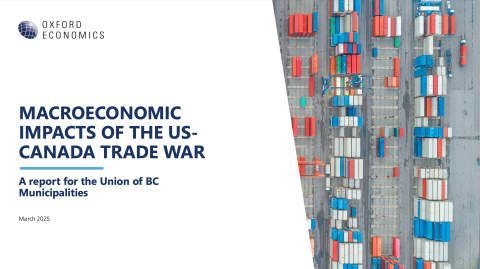In response to the trade war with the US, UBCM has engaged Oxford Economics to develop modelling on how escalating tariffs will affect GDP, employment and a host of other macroeconomic impacts in BC and Canada. Read the full report: Macroeconomic impacts of the US-Canada Trade War.
With the rapid changes to tariff policy from the US government, it is impractical to develop a model that responds to each new announcement and tariff reversal. Our approach with the model is to look at the big picture of how increased tariffs can be expected to affect our economy, and how stimulus funding will blunt that impact. UBCM will use this modeling to support our advocacy with the provincial and federal governments.
Top line, BC is in better shape than central Canada. This is largely because BC has less manufacturing than places like Ontario and Quebec, and because almost half of our exports already go to countries besides the US. The negative impacts will still be significant for BC, however. Overall, BC’s GDP could be affected by as much as $5.6 billion in 2026 and as many as 31,000 jobs could be lost in the peak of this trade war.
The modelling shows that investing in infrastructure stimulus funding will blunt these negative impacts, generate more GDP in the economy than it costs to invest, and result in legacy infrastructure projects our communities already need.
This is the basis of UBCM’s advocacy to the provincial and federal governments related to the trade war. We also continue to press the importance of including local government voices in the provincial response to the US tariff threat and have asked to be kept apprised of provincial responses.
UBCM President Trish Mandewo and Executive Director Gary MacIsaac will be at the Area Association meetings this spring to share the findings of this work with members. Read the report and learn more about our advocacy on the Current Issues page.

